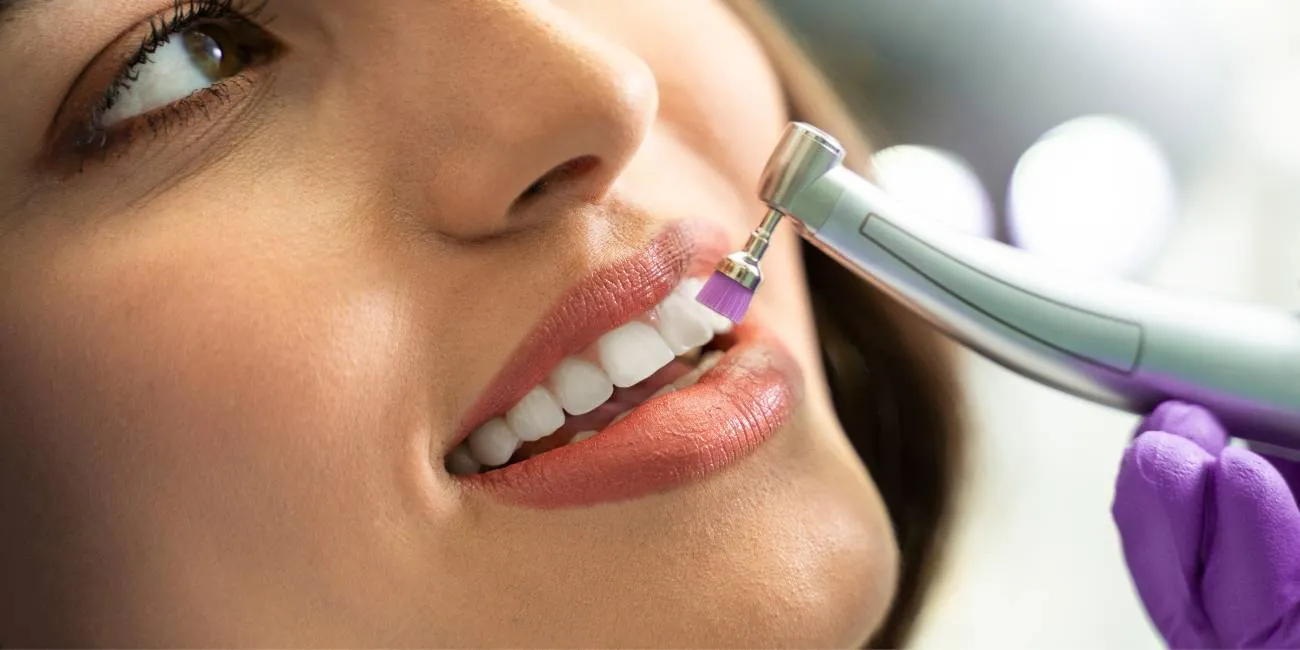
Teeth scaling and polishing is a basic dental procedure that helps maintain oral health. It removes plaque, tartar, and stains from teeth, making them look clean and healthy. This treatment is commonly done by dentists and is important for both Teeth scaling and polishing and hygiene. People of all ages can benefit from regular scaling and polishing.
What is teeth scaling
Scaling is a method used by dentists to remove hardened plaque called tartar from the surface of the teeth. Tartar forms when plaque is not cleaned properly and hardens over time. This cannot be removed by regular brushing or flossing at home. Dentists use special tools to scrape off the tartar from above and below the gum line.
Scaling is especially useful in preventing gum diseases like gingivitis and periodontitis. It reduces inflammation and stops bacteria from spreading under the gums. Without scaling, the tartar continues to build up and can lead to severe gum issues.
What is teeth polishing
After scaling, teeth are polished to make the surface smooth. This helps in removing stains caused by tea, coffee, smoking, or certain foods. Polishing also slows down the build-up of plaque on the smooth surface of the tooth.
A polishing tool with a soft rubber cup and a special paste is used. This makes teeth look shiny and clean. Polishing is a painless process and often gives instant results in terms of a brighter smile.
Why is it necessary
Teeth scaling and polishing is necessary to maintain good oral hygiene. Even with regular brushing and flossing, some areas of the mouth are hard to clean. Over time, food particles and bacteria collect in these spots, turning into plaque and later tartar.
If tartar is not removed, it can cause gum irritation, bad breath, and tooth decay. In serious cases, it may even lead to tooth loss. Therefore, scaling and polishing help prevent future dental problems.
How often should you get it done
Most dentists recommend scaling and polishing every six months. However, some people may need it more frequently depending on their oral health condition. People who smoke, have diabetes, or are more prone to gum disease may need this treatment every three to four months.
Your dentist will guide you on how often you should get scaling and polishing based on your individual needs. Regular check-ups are important to decide the right time for the treatment.
Who should get scaling and polishing
This treatment is suitable for almost everyone. Children, adults, and older individuals can benefit from clean teeth. It is especially important for people who have braces, dentures, or any kind of dental work. It helps in keeping those areas clean and free from infections.
People who drink a lot of tea, coffee, or smoke often develop surface stains on their teeth. Polishing helps in removing these stains and gives a fresh appearance to the teeth.
Is the procedure painful
Most of the time, teeth scaling and polishing is not painful. Some people may feel slight discomfort, especially if they have sensitive teeth or gum disease. Dentists use gentle techniques and can also apply numbing gel if needed.
The treatment usually takes between 30 minutes to an hour, depending on the condition of your teeth. After the procedure, your teeth might feel cleaner and smoother. Some people may feel slight sensitivity to hot or cold for a day or two, which is normal and temporary.
Benefits of scaling and polishing
There are many benefits of this dental treatment. It helps in removing bad breath by cleaning bacteria and plaque. It also reduces the chances of gum disease and tooth decay. Teeth look cleaner, brighter, and more attractive after polishing.
This treatment boosts overall oral health. Healthy gums support strong teeth. Clean teeth reduce the risk of cavities. Also, it helps in keeping your smile confident and fresh. In many cases, it can even help detect other dental problems early.
Precautions after the procedure
After scaling and polishing, it is important to take care of your teeth to maintain the results. Avoid eating hard or sticky foods for a few hours. Drink plenty of water and rinse your mouth after meals. Use a soft-bristled toothbrush and a fluoride toothpaste.
Avoid smoking or drinking tea or coffee for at least 24 hours to prevent new stains. Some dentists may suggest using a mouthwash to keep the mouth clean and free from bacteria. If your teeth feel sensitive, avoid very cold or hot foods for a day or two.
Myths about scaling and polishing
There are many myths related to this treatment. One common myth is that scaling weakens the teeth or damages the enamel. This is not true. If done by a trained dentist, scaling does not harm the teeth. It only removes harmful deposits.
Another myth is that polishing makes teeth more sensitive. In reality, it helps smoothen the surface and reduce bacterial buildup. Sensitivity, if any, is usually mild and temporary. This treatment does not whiten teeth permanently, but it does improve their appearance by removing stains.
When to avoid the treatment
Although teeth scaling and polishing is safe, there are some situations when it should be postponed. If you have mouth sores, bleeding gums, or dental infections, the dentist may suggest waiting until the condition improves.
Pregnant women should also inform the dentist before the procedure. In most cases, it is safe, but the dentist might choose to delay it depending on the health of the patient.
Conclusion
Teeth scaling and polishing is a simple and effective way to maintain good oral hygiene and a fresh smile. It removes plaque, tartar, and stains, which helps in keeping your teeth and gums healthy. Regular dental visits and proper care after the procedure are important for long-term oral health. For those looking for professional and gentle teeth scaling and polishing services, hash clinics offers quality dental care tailored to your needs.
Comments on “Teeth Scaling and Polishing for Healthy and Clean Smile”